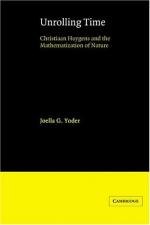|
This section contains 1,743 words (approx. 6 pages at 300 words per page) |

|
Overview
In the period between the death of Galileo (1564-1642) and the rise to fame of Isaac Newton (1642-1727), Christiaan Huygens (1629-1695) stood alone as the world's greatest scientific intellect. His treatment of impact, centripetal force, and the pendulum helped clarify the ideas of mass, weight, momentum, and force, thus making it possible for dynamics and astronomy to advance beyond mere geometrical description, while his wave theory of light helped initiate modern physical optics. Beyond such specifics, Huygens exercised a profound influence on the progress of science through his use of quantitative methods.
Background
The scientific achievements of Huygens were realized under the aegis of a methodology that successfully combined empiricism and rationalism. The empiricist tradition, which found its canonical formulation in Francis Bacon's (1561-1626) Novum Organum, was...
|
This section contains 1,743 words (approx. 6 pages at 300 words per page) |

|


